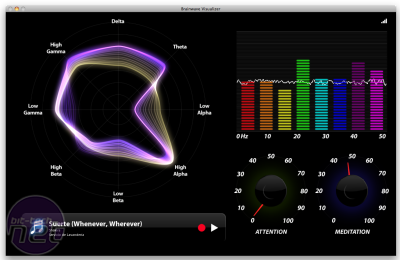
The future of mind control
As with any emerging industry, there are hurdles ahead. For widespread adoption among non-specialised users – laymen rather than scientists or doctors – a critical mass needs to build. “The technology has to be fairly well established, the applications need to be available,” says De Freitas of the Serious Games Institute, though she adds that she thinks this point is not far off.
“The technology has to be fairly well established, the applications need to be available,” says De Freitas of the Serious Games Institute, though she adds that she thinks this point is not far off.As for casual gamers, there are a number of questions. With games that require the continual manifestation of specific mental states, users may become tired or frustrated. As such, Neurosky suggests that its headsets would not replace other controllers altogether, but would instead supplement them, adding extra aspects of gameplay. A relaxed mental state could trigger a stealth mode, for example.
There is also the issue of price. iPhone games can cost a few dollars, and regular games are not a great deal more. Headsets, however, currently start at around $200. Gamers will require convincing to stump up; incentives might include cheaper headsets and bundling software to make for a more attractive purchase.
 For now, the companies are thinking big. Neurosky says it has created contactless sensors, and Yang, the CEO, predicts a time when they are everywhere. A house might respond to its occupant falling asleep by dimming the lights and turning the television off. Cars could have sensors that detect if drivers are sleepy or drunk; indeed, Yang says Neurosky has partnered with two major car manufacturers, but declines to provide details.
For now, the companies are thinking big. Neurosky says it has created contactless sensors, and Yang, the CEO, predicts a time when they are everywhere. A house might respond to its occupant falling asleep by dimming the lights and turning the television off. Cars could have sensors that detect if drivers are sleepy or drunk; indeed, Yang says Neurosky has partnered with two major car manufacturers, but declines to provide details.Emotiv is also keeping many of its plans under wraps, but Do, the co-founder, says one of the firm’s ideas is a tool that searches through photo archives based on images in a user’s head.
Ultimately, he says, we might begin interacting with computers in the same way we interact with other people.
“A large part of our communication with each other is taking into account the others' non-conscious thoughts, emotions and expressions. It is so embedded in our lives that sometimes you don’t even notice it,” he says. “This is our vision for the human-computer interface.”

MSI MPG Velox 100R Chassis Review
October 14 2021 | 15:04








Want to comment? Please log in.